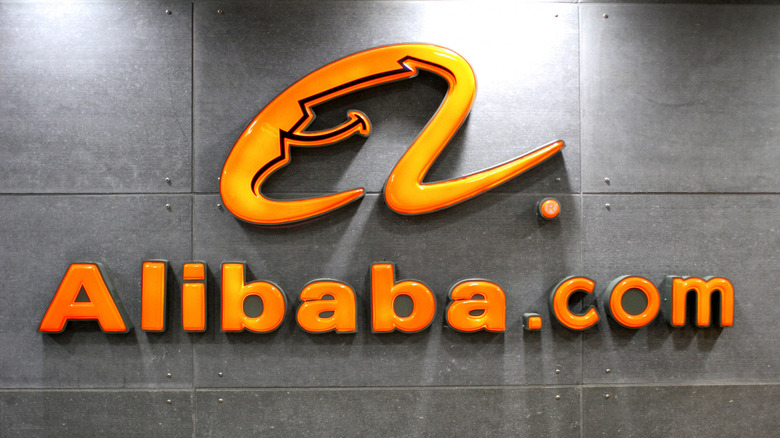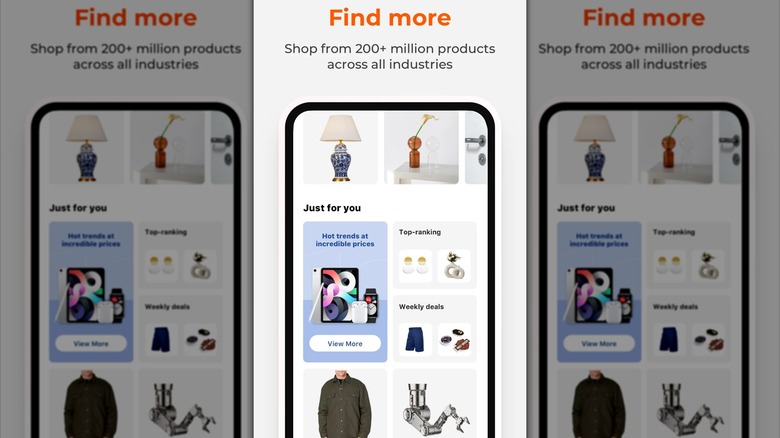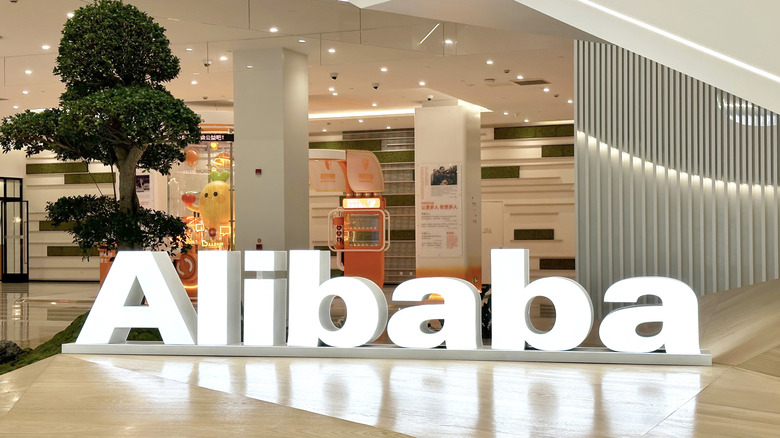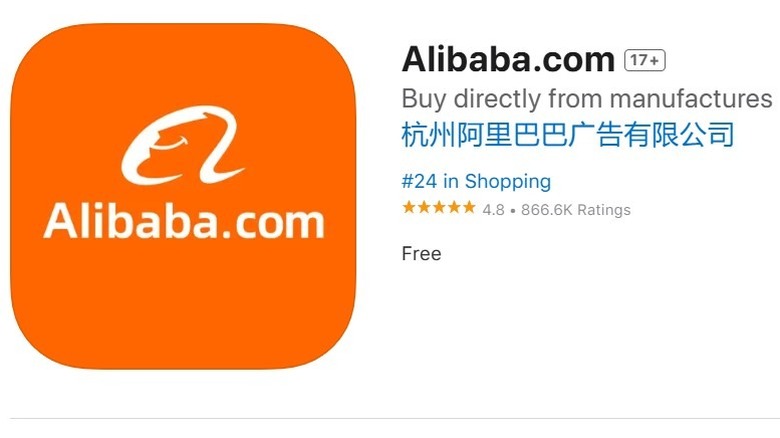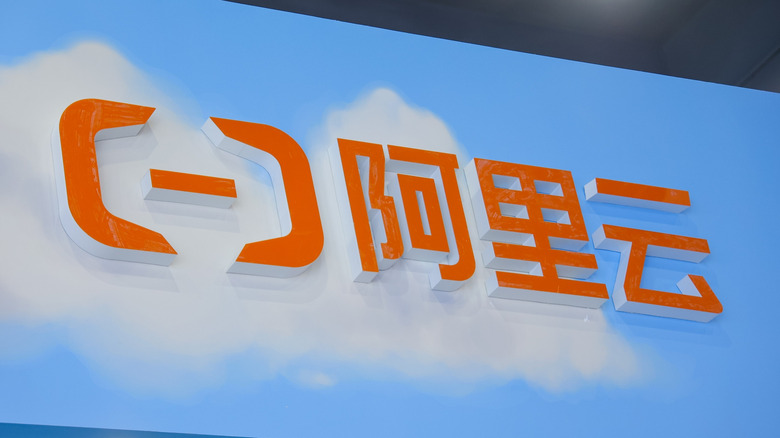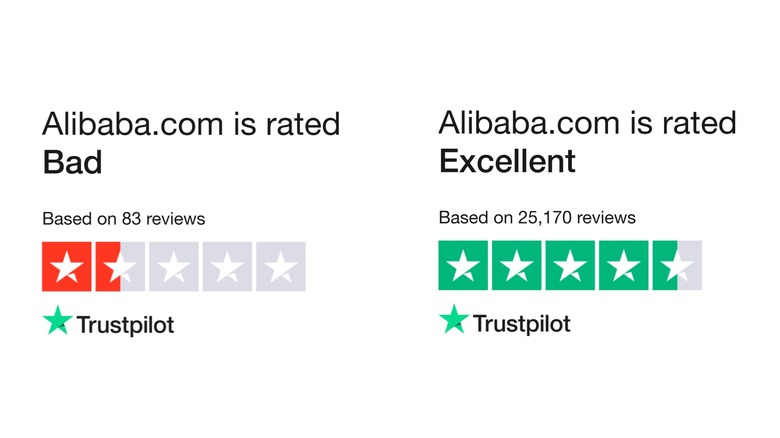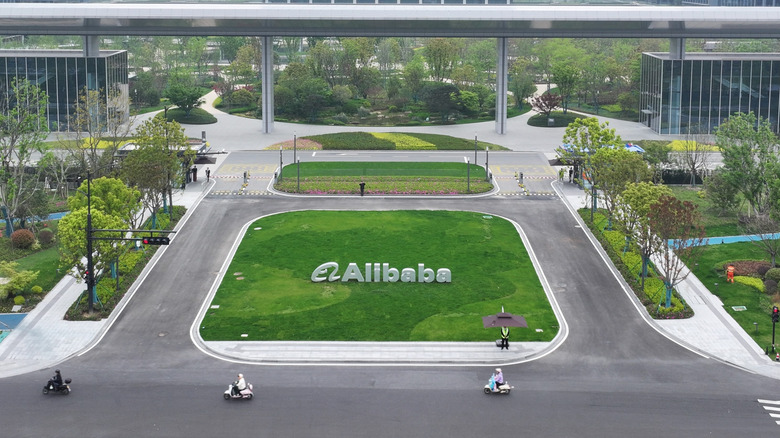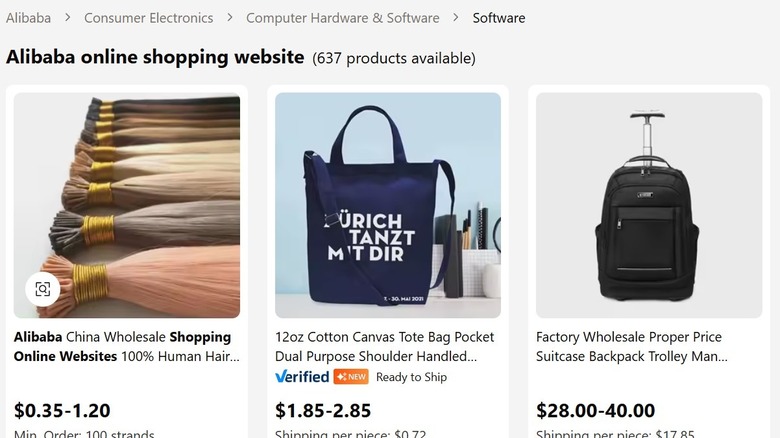The Shady Side Of Alibaba: It Is Safe To Order From This Online Marketplace?
When you're looking for a deal online, it can be hard to figure out what retailers are reliable and trustworthy. Although a handful of names are well-known and generally well-respected, new retailers are popping up all the time. Many of those retailers have deals that are hard to pass up. At the same time, shady business practices abound, and it's hard to know who to trust.
You might wonder whether Temu is safe to order from, whether Shein is using your app data for more than shopping recommendations, or whether Alibaba is actually a real, reliable retailer, or just a big scam.
While things can go wrong when you order from any website — even the industry giants — there might be a reason so many people are suspicious of Alibaba. Plus, some details don't necessarily add up, like Alibaba's "excellent" rating on Trustpilot amid complaints (many of them on Trustpilot, in fact) about fake products, bad sellers, and late or nonexistent refunds.
Like Temu, which has a shady side, Alibaba also has some controversies that suggest that not everything is as it seems. Here's everything to know about the shady side of Alibaba, and why you might not want to order from the retailer.
[Featured image by Mfn via Wikimedia Commons | Cropped and scaled | CC BY-SA 4.0]
Alibaba paid millions after monopoly accusations
Sure, Alibaba is a real shopping platform, and yes, things can go wrong sometimes. However, behind the scenes, Alibaba was also accused of monopolistic practices, and it apparently didn't have a viable defense for the charges.
Investors in the U.S. filed a lawsuit against Alibaba that alleged the e-commerce company violated some laws relating to unfair competition and monopolies. Part of the lawsuit centered on reportedly misleading statements from Alibaba, which according to the investors was tied to market losses.
Eventually, Alibaba agreed to pay $433.5 million following the class-action lawsuit, which the plaintiffs' lawyers stated was "exceptional." It turned out the investors were said to have lost around $10 billion, but they accepted the settlement from Alibaba for far less than that amount. Based on the way Reuters described the case, it sounds as though the investors settled rather than pursue a drawn-out court case, but they also forfeited billions of dollars.
What's interesting about this case is that it involved shareholders and not the public. Although monopolizing the industry might help the shareholders make more money, their objection was apparently about a combination of finances and the reputation of Alibaba.
Consumers don't seem to trust Alibaba
Is it safe to purchase from Alibaba? Technically, yes, but the retailer itself has cautionary words for shoppers. In an interesting approach to search engine optimization, Alibaba writes about its own brand in the third person, asking whether it's safe to buy things through the e-commerce company. In answering its own question, Alibaba notes that there are problematic sellers on every platform but that on the whole Alibaba is safe. Alibaba's blog post suggests that consumers check out the history of any seller they plan to buy from. It also states that product quality can vary, so shoppers should be wary of matching product descriptions to images and specifications and request samples before ordering.
Further, Alibaba suggests that payment security is not a concern because secure payment methods (like Alibaba's payment platform Alipay) give consumers protection services and avenues for pursuing refunds and disputes. Alibaba also implores shoppers to report counterfeit and other potentially copyrighted products.
Of course, consumers may also be wary of sharing their data with the Alibaba app. After all, many apps steal more data than users are aware of, and cybersecurity is an important part of the online shopping experience, no matter where you buy from.
Low-quality products are a common complaint
Alibaba's prices are generally very low, which is part of the reason it's so successful. At the same time, Alibaba isn't a single vendor. Rather, it's a marketplace, almost like Amazon, where almost any business can begin selling products. That's where one of the problems with Alibaba lies because there doesn't seem to be much (or any) oversight of sellers on the platform.
Consumers generally report receiving low-quality products, as evidenced by countless Trustpilot reviews, but the products they complain about run the gamut from toilets to UTVs to smart rings. Plenty of people write reviews in all-caps saying that Alibaba is a scam, and the general theme seems to be that despite an apparent money-back guarantee, Alibaba may refuse to give customers their money back.
There might be inherent risk in purchasing from Alibaba the same way there's risk in purchasing from sites like Temu simply because there are too many sellers for the hosting website to sort through. At the same time, it doesn't seem as if Alibaba is focused on weeding out problematic sellers, especially because it asks customers to do that work for them by way of reporting faulty goods or poor policies.
Alibaba might enable knockoff brands and shady sellers
In addition to Trustpilot reviews alleging that many products on Alibaba are low quality, there's also the issue of knockoffs and counterfeit goods. Many shoppers have reported receiving counterfeit goods, specifically misrepresented name-brand products. Alibaba was also sued for allowing allegedly fake Squishmallows.
Kelly Toys Holdings, which manufactures Squishmallows, sued Alibaba in 2023 over the issue. The lawsuit alleged that around 90 e-commerce companies had listings that advertised inauthentic Squishmallows but that Alibaba did not take action to stop the sales.
Alibaba requested to have the case dismissed, but a court determined that it could proceed. It appears the case is still in progress as of 2024, and the court itself stated that the claims were "plausible." The lawsuit was also not the first relating to the sale of Squishmallows, but it's unclear how those were resolved; Kelly Toys Holdings noted that prior requests to remove the products were not honored.
While there are some ways you can determine whether you're on a scam website, it's hard to tell which sellers might be scammers. For now, however, it's safe to assume that any Squishmallows for sale on Alibaba are fakes.
Consumers report not receiving refunds
Along with innumerable complaints about poor-quality products, consumers have also made various claims about Alibaba's refund process. Consumer complaints to the Better Business Bureau had the recurring theme of customers not receiving refunds for faulty or returned products (or failed deliveries).
Trustpilot was similar, with many one-star reviews claiming that the consumer had ordered products that never showed up, went to the wrong place, or arrived damaged. In many of these scenarios, the customers claimed they didn't get their money back at all, despite Alibaba's claims of consumer production via its payment processing protocol.
Various commenters on Trustpilot also brought up the fact that when they made purchases on the retail giant's website, they paid certain fees. Then, when they returned the item because it was not in good condition or didn't meet their expectations, they didn't get all of their money back.
In direct contrast with Alibaba's money-back policy, Trustpilot and BBB consumer comments show a worrying trend where people don't get their money back, even when an item arrives broken. Alibaba's policy even states that you can request a refund even if it doesn't meet the "agreed terms," though it's unclear whether that means the seller's terms or Alibaba's overall terms. Either way, consumer experiences don't tend to reflect that money-back promise.
Alibaba shopping horror stories abound on TrustPilot
As mentioned, TrustPilot reviews sum up a range of issues with Alibaba, and there are plenty of horror stories about shopping on the platform. Despite Alibaba's (the parent company's) 4.3-star average on Trustpilot, around 11% of the reviews are one-star, while under 1% are two-star, and about 2% are three-star. Alibaba.com also has poor reviews on Trustpilot, rated "bad."
The most recent reviews complain of products not arriving (despite assurances from sellers that they were being tracked and in transit), thousands of dollars of product arriving faulty but an incomplete refund being generated, and Alibaba refusing refunds despite clear photo and video evidence of damaged-on-arrival products.
Mercari has similar red flags and a similar business model, with countless sellers sharing the same platform. Unfortunately for Alibaba, its sellers contribute to the brand's overall reputation, and things are not looking good. Things are similar on BBB, where Alibaba Group has a 1.15-star rating, with around 40 monthly complaints closed.
Customers complained to BBB about generic responses to refund requests from Alibaba, suggesting that the company uses a script or perhaps an AI chatbot to address consumer complaints. Although Alibaba has a history of addressing complaints on the BBB website, many remain open and, apparently, unanswered.
A Trade Assurance program doesn't apply to everyone
Trade Assurance is a consumer protection with Alibaba, and the e-commerce company claims that consumer purchases enjoy protection from payment to delivery. However, the policy doesn't apply to shoppers in every country, nor does it apply to every seller.
The trade assurance program apparently doesn't apply to retailers that don't have a "Trade Assurance" badge, although the details don't seem very transparent. There's also the fact that the trade assurance does not seem to apply to all purchases, as the information page on Alibaba's website seems to be targeted toward businesses rather than individuals shopping for cheap clothes and goods online.
The trade assurance also claims to offer after-sales protections, yet the reviews on Trustpilot and the BBB do, in part, contradict that statement. On the other hand, the 79% of Trustpilot reviews that gave the company five stars seemed thrilled with their purchases, although the dozen or so that I skimmed through did not mention a specific product in their glowing review of the site and its sellers.
Alibaba's website also flagged my multiple visits to its policy pages, requiring me to solve a CAPTCHA-type puzzle before I could keep reading. While that on its own isn't necessarily problematic, it doesn't make the retailer seem any more friendly to prospective or existing shoppers.
Many praise Alibaba's business model, but shoppers don't
Beyond customer reviews, online forums like Reddit, and the couple of court cases in which Alibaba is involved, it's hard to find anywhere that it has addressed criticism of its online shopping platform. In fact, Harvard Business Review published a piece by Ming Zeng (former manager and current chairperson) that called Alibaba an "innovative digital giant," praised its business practices, and neglected to mention any of the negative customer feedback that can be found online in a quick Google search.
This juxtaposition is one of the things that makes Alibaba seem shady. From addressing consumer skepticism over its legitimacy to having one of its figureheads promote it in HBR (did someone from the corporation have to sign off on that article?), Alibaba seems to want to make a good impression.
On the other hand, not addressing complaints on review sites and, apparently, not following its own policies go against that goal. Plus, the HBR piece focuses solely on the company's "innovative" processes and how it handles all its inventory and customer processes on a massive scale. What it doesn't address is the customer experience or any feedback the company has received.
Like other "fast" online companies such as Temu, Shein, and more, it seems that Alibaba might be more focused on its bottom line (and perhaps defending itself in court) than it is about ensuring that consumers have a positive experience.
Alibaba's founder isn't a favored public figure
In the U.S., it's remarkably common for brands to grow to global fame with their founders as the recognizable face of the company. From Amazon and Facebook to Apple and Microsoft, we know who the bigwigs are and what they do. While the public might not love their local billionaires, they do appreciate their business offerings, and these people are generally accepted if not beloved, public figures.
In contrast, Alibaba's co-founder does not have a good relationship with the public or the company's country of origin. Jack Ma, who founded Alibaba, criticized regulators and the Chinese financial system. That led to him losing money — the loss was said to be more than half of his wealth — disappearing from public view, and according to some perspectives, putting Alibaba in jeopardy.
If Ma lost $4.1 billion in a single year, as CNN reported he did, how much did Alibaba lose or stand to lose? With the founder of the company being under fire from his government, it doesn't seem like that's a great public relations move for Alibaba, and it makes the company seem even shadier.
Alibaba owns more than online retailers
It's not inherently suspicious for a company to own more than one type of business. Given the claims of monopolistic activities on the part of Alibaba, it may be worth taking a closer look at the conglomerate.
Alibaba owns various companies — from cloud computing to healthcare to media entities — thus it's easier to understand why the parent company was sued for supporting a monopoly. It would make sense if Alibaba used its own proprietary technology and products to run its various businesses, interlinking them and, potentially, creating even more wealth.
Yet, it's hard to know whether to trust articles in the South China Morning Post about the company, given that Alibaba Group also owns it, and the same applies when it comes to utilizing other subsidiaries of Alibaba's parent company.
Of course, if the real question is whether it's safe to order from Alibaba, despite its potentially shady dealings, the answer is it depends — so shop at your own risk.
